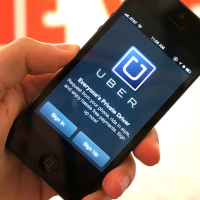App-Driven Taxi Services Swarming L.A. Cite State Support in Defying the City

Los Angeles officials probably have a few choice four-letter words for the online, app-driven car-for-hire services now being offered in the city, and none of them are “taxi.”
Alternatives to traditional taxicabs—Uber, Lyft and Sidecar—have arrived in Los Angeles with the temporary blessing of the state Public Utilities Commission (PUC), and been slapped with a cease and desist order by the city.
They took less than a day to defy the order. “If the city has a beef with the state of California, then maybe those two entities should talk,” Uber founder Travis Kalanick told the Huffington Post.
The companies argue that that they have been given permission by the PUC to operate statewide while permanent ways to regulate the fledgling transportation business are considered. Los Angeles officials think the PUC is allowing them to operate as long as they don’t violate local laws, which it alleges they have.
“Due to the fact that your company has no permits or license to transport passengers for hire, in the interest of public safety, [company name], including all of its agents and contractors, is hereby directed to cease and desist from picking up passengers within the City of Los Angeles,” L.A. taxicab administrator Thomas Drischler wrote in letters delivered Monday.
The city threatened to arrest the drivers and impound their vehicles if they keep operating.
Uber, Lyft and Sidecar and startups like them use variations on a common theme: Hailing a cab with a smartphone app is much faster than waiting for a cab service to dispatch someone from its fleet. Uber essentially allows all legitimate cabbies who already have permits on its network of available taxis, while Lyft and SideCar employ the questionable practice of letting any drivers plugged into their networks pick up customers in exchange for a “voluntary donation.”
All three have loyal followings in San Francisco, where they established a presence while battling traditional taxi services, City Hall and the PUC. Last October, the agency fined the companies and slapped them with cease-and-desist orders while it pondered its next step.
Its next step was to drop the fines and the desist orders as it considers how to regulate rates, insurance, safety, reliability and fairness for the startups while not illegally impairing the application of new technology.
Uber is the most widespread of the three companies, with a California presence in Los Angeles, San Francisco, San Diego, Orange County and Napa. Nationally, it’s in New York, Boston, Chicago, Washington D.C., Denver, Atlanta and more.
An administrative law judge is expected to propose statewide regulations by July 9 which wouldn’t be considered by the PUC before August 15.
–Ken Broder
To Learn More:
Lyft and UberX to Keep Operating in L.A. Despite City Orders (by Salvador Rodriguez, Los Angeles Times)
LA Cease-And-Desist Letter To Ride-Sharing Apps Highlights Legal Gray Area (by Anna Almendraia, Huffington Post)
Los Angeles Taxi Cab Drivers Protest Ride-Sharing Apps Like Lyft, Sidecar & Uber (by Robert Jablon, Associated Press)
Los Angeles Rideshare Services Stand Up to Dept. of Transportation and Grumpy Cabbies (by Tracy Oppenheimer, Reason)
Taxi Alternatives Are on the Move (by Jefferson Graham, USA Today)
Taxi Technology Revolution Stirs Passenger Passion and Driver Revolt in Bay Area (by Ken Broder, AllGov California)
- Top Stories
- Controversies
- Where is the Money Going?
- California and the Nation
- Appointments and Resignations
- Unusual News
- Latest News
- California Forbids U.S. Immigration Agents from Pretending to be Police
- California Lawmakers Urged to Strip “Self-Dealing” Tax Board of Its Duties
- Big Oil’s Grip on California
- Santa Cruz Police See Homeland Security Betrayal in Use of Gang Roundup as Cover for Immigration Raid
- Oil Companies Face Deadline to Stop Polluting California Groundwater





